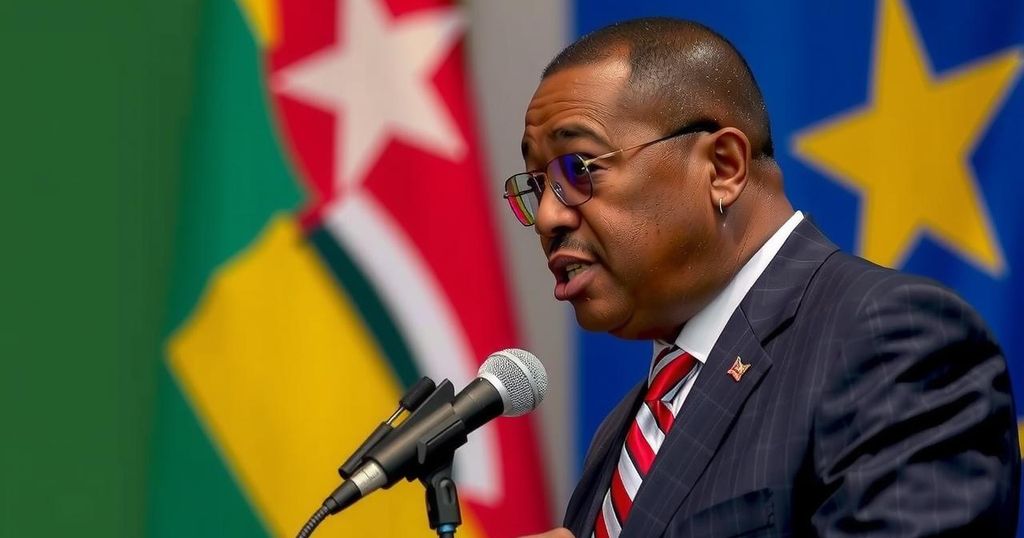Outgoing Mozambique President Filipe Nyusi has called for dialogue with four presidential candidates to address post-election unrest following widespread protests against alleged electoral fraud. At least 30 people have died amid the turmoil. While Nyusi is committed to pacifying the nation, skepticism exists about the sincerity of his invitation, particularly due to ongoing legal actions against opposition leader Venancio Mondlane.
In a recent address to the nation, outgoing President Filipe Nyusi of Mozambique extended an invitation to four presidential candidates for dialogue, aiming to quell weeks of intense post-election unrest that has resulted in multiple fatalities and numerous injuries. Following the October 9 elections, where ruling party candidate Daniel Chapo was declared the victor, accusations of electoral fraud surfaced, leading to widespread protests. The government has categorically denied these allegations. Nyusi highlighted the detrimental effects of the ongoing demonstrations on the economy, noting that they hinder business operations and exacerbate unemployment issues. He affirmed his commitment to achieving peace in Mozambique until the conclusion of his term and expressed a desire for unity among all citizens to address the nation’s challenges. The president hopes that discussions with the four electoral candidates could yield constructive outcomes for the country. Reports indicate that at least 30 individuals have lost their lives due to the violence that erupted following the electoral declaration of Chapo’s victory, which was claimed to be achieved with over 60% of the vote. Opposition candidate Venancio Mondlane, who garnered 20%, has vocally contested the election’s legitimacy and urged for nationwide protests. International observers have reported several irregularities in the electoral process. Nyusi’s call for dialogue coincides with legal actions taken by the Attorney General’s Office against Mondlane and his party, requesting restitution for damages incurred during the protests. Human rights advocate Adriano Nuvunga expressed concerns that the government’s dialogue initiative lacks sincerity, pointing out that Nyusi has frequently deferred to the Constitutional Council regarding the electoral results, thus undermining their legitimacy. Mondlane has attributed Mozambique’s pressing issues, such as rampant poverty and high youth unemployment, to historical grievances with the ruling Frelimo party. Methodist Bishop Dinis Matsolo, however, believes that dialogue remains essential for restoring peace in Mozambique. He articulated the view that the current unrest stems from significant mismanagement of the electoral process, emphasizing the necessity for conversations to rectify these problems. Currently, none of the four candidates have responded to Nyusi’s invitation for dialogue, and Chapo’s inauguration is set for January.
The political climate in Mozambique has been severely strained following the recent presidential elections held on October 9. There have been significant protests in response to the perceived unfairness of the election results, which declared Daniel Chapo of the ruling Frelimo party the winner. These demonstrations have not only resulted in loss of life and injury but have also raised concerns about the integrity of the electoral process in Mozambique, showing signs of a deep-seated discontent among the electorate regarding governance and representation. The call for dialogue by President Nyusi is seen as a crucial step in addressing these tensions and restoring national stability, although skepticism remains about the government’s commitment to meaningful engagement.
In summary, President Filipe Nyusi’s invitation for dialogue reflects a pressing need to address the violent post-election unrest in Mozambique, attributed to claims of electoral fraud. While Nyusi emphasizes the importance of national unity and economic stability, skepticism persists regarding the government’s intentions, especially in light of ongoing legal actions against opposition figures. The situation calls for earnest dialogue among all parties involved to rectify electoral grievances and foster peace in a country grappling with significant challenges.
Original Source: www.voanews.com







